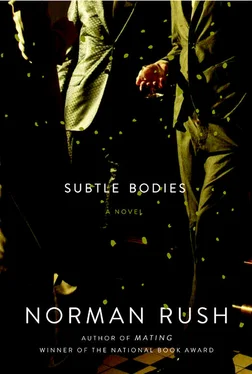Joris fell silent. They waited. The trace of foreignness in his speech was still there, but faint. Ned remembered telling Joris I said to me was impossible English in probably the first week of their friendship. No one could claim they hadn’t all been helpful to one another.
Gruen was fumbling around distractingly under the spread. Intoning, he said, “A man, a plan … a banana,” and pulled one out from the bedclothes.
Joris helped himself to more sambuca. He was having a contemplative interlude. It ended. “I live in pain,” he said, in a flat tone. He followed the words with a smile, obviously meant to be rueful but registering with Ned as desperate.
Cancer , Ned thought. He sat up in his chair, rigid. Gruen violently reorganized the pillows behind his head so that he could turn on his side and look straight at Joris more easily.
Ned said, “What do you mean?”
“It’s not medical. Relax,” Joris said.
“Thank Christ,” Ned said. So then it would be depression.
Joris said, “And also it’s not depression. I am not depressed and I tell you absolutely there’s nothing a shrink could do. It’s not all the time. It’s like this, it’s like an insect sound that comes up when I think about my life. My life so far. And the insect sound has pain connected to it. It’s like tinnitus that hurts when I consider certain things …”
Ned said, “I thought it was going to be cancer. Jesus. It does sound like depression to me, actually …”
Joris said, “I thought it wouldn’t come when I got here. Don’t ask me why. But.”
Gruen said, “Remorse, it sounds like to me.”
“For what ?” Ned said, irritated.
Gruen was ahead of Joris in the sambuca department and the result was that pretty soon everything he had to contribute would be a non sequitur. Ned could see that coming, Gruen turning into an impediment. It was something that happened when Gruen drank.
Joris said, “The truth is I have nothing to complain about. My sons are okay, and they’re good very good to their mother.”
“Then don’t complain,” Gruen said.
Oh no, Ned thought. Drink also brought out a censorious side of Gruen. It was an odd thing. It was contrary to the normal Gruen.
Gruen said, “It’s remorse, it sounds like.”
“You said that. What is?” Joris said.
“The way you feel that you were just complaining about.”
“What’s your point, if there is one?” Joris was getting angry.
Gruen said, “Okay, you go to whores and it’s friendly but underneath they are doing it with you against their real wishes … That’s whoring. They do it with people they might reject in a free state of mind. I’m not saying anything you don’t know.”
This was wrong, Ned thought. Joris had arrived at some kind of personal adaptation to a problem, an unfortunate fetish for married women, and it was working, and his friends should support him. It was simple.
“Wait a second,” Ned said. “It’s not your business. You get paid for what you do and you don’t only do what you would do for free. And it’s working for Joris, and it’s presumably working for the women who’re happy to see him show up at the door.”
Beyond that, Ned didn’t know what to say. Douglas’s death was bound to bring out all the anxieties that go with looking back and summing up what a life came down to, the choices made, what the verdict would be if life ended suddenly without any warning or chance to do the things that were left to do that could improve the judgment an existence got. That was the downside of sudden death. A downside, he meant. But the moods Joris was talking about had been going on long before Douglas died.
Gruen was not through with Joris. Ned could tell because Gruen was running his tongue over his upper teeth. That meant he was about to say something important. It went with alcohol.
Ned wasn’t satisfied with what he himself had said, so far. There seemed to be no place to go with Joris’s declaration, his confession. Joris had trusted them.
Gruen said, “I’m sorry. I can be wrong. In fact I am. So I’m sorry.”
Ned thought, It’s too late.
Joris said to Gruen, “Thank you, David.”
Ned thought, I wish Joris could just be for something. Or against it … how pointless of me, but it could be the Anglo-Saxon Invasion, if he would let it.
Ned said, “We all have our dark moments.” In some dark moments — visited by sins of omission, mistakes … Ned would say aloud, Mutual Aid . It was a trick. Ostensibly he was reminding himself of a classic he had pledged to read years ago, and hadn’t. It was a trick that in a disguised way acknowledged the stab of regret and in the same breath knocked it away. What Is to Be Done? was another title he used. Nina had figured it all out, of course.
What the friends needed was to be back at the round clawfoot table in their Second Avenue place, everybody sitting up alert, a decanter of red wine on the table, somebody saying This is the issue before us , bringing his fist down like a gavel, Elliot usually, or Douglas, or he himself, often enough.
They were in a conversational eddy. Gruen had gotten out of bed, dispensed with the sweater he’d been wearing, and begun to stalk aimlessly around the room in his boxers. Ned thought, Man I love you but you need a regimen. Between sips of sambuca Gruen seemed to be free-associating about his wife, Helen, more to himself than for the benefit of the group. He was proceeding as though it was his turn to talk about his intimate life. If they think I’m going next after Gruen in this area, they can forget it, Ned thought.
Gruen’s disclosures were on the pastel side, after Joris’s. Helen always wanted certain music on during sex and Gruen had to have just gotten out of the shower and he had to be sure to remember to see that his nails were groomed. His wife always wore a negligee for the occasion. He couldn’t complain. She had to sort of elevate the thing in order to let go, for some reason. It didn’t matter. She put her heart into it. She was taking a plunge, each time. For her it was like going off a dive tower.
“You have to give her credit,” Gruen said, wanly.
“We do,” Joris said, which was a peculiar thing to say. But then what Gruen had said was peculiar, seeming as it did to take the position that his wife deserved credit for having sex. Ned thought, You can ask about certain facts of life but not others. And evidently that was all Gruen had to say for the moment.
And Joris was dormant. In fact, both of them were looking expectantly in Ned’s direction. I love group dynamics, Ned thought. The body language directed at him was saying he should now give them the minutiae about Claire. He didn’t want to. He would tell what he had to.
Joris startled him by saying, “I loved Claire. And then I hated Claire. Watch me speak freely on this. When in the future history of the world I am ever going to find a group of people interested in my opinions on this subject is never. So here’s the truth. She was a shit. With all respect, because I know you got together with her on the coast and then you were together for those years, she was no good. And she was so pale I always wanted to buy her a steak. Douglas was her tool. She made little things disappear. When she came into the room everybody had to try to ignore her beauty so anything separate from her could get done, which she knew. And she wasn’t a nice person. She was passive. She was so passive that anything anybody proposed that didn’t work out was somebody else’s fault. She was the one who got us banned from the Alliance Française. I forget what she did …”
For Ned, there was shock to digest. It was a subject that could trap him into ugliness in what he said. But he had to say something. He thought he knew where to go. He said, “I’m not going to say anything about Claire, really. Although it’s interesting to hear that she had itchy fingers even back then. You know we connected over a shoplifting incident when I was at Pacific Co-op for a while and then lo and behold. This was three or four years after NYU. Gruen knows about it already. A clerk caught her shoplifting. I took care of it and that’s how it started up with us. A Nation of Shoplifters, somebody said back then …”
Читать дальше











